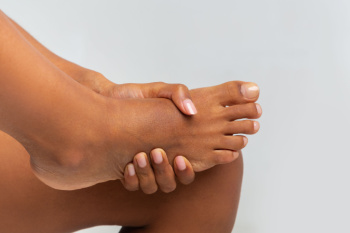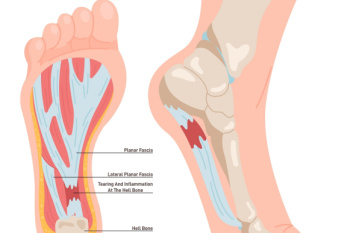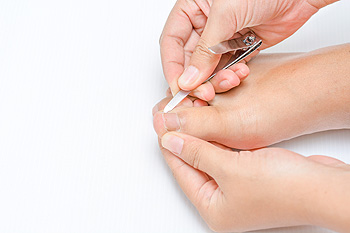Baytown, TX (281) 837-8371
April 2025
The Importance of Everyday Foot Care

Foot health is essential, yet often neglected, and keeping your feet clean is key to preventing bacterial, fungal, and microbial infections. Feet are vulnerable to conditions like athlete’s foot, toenail fungus, and other infections due to moisture, poor hygiene, and tight shoes. Without proper care, these infections can thrive, causing itching, redness, swelling, and a strong odor. Skin may crack or blister, and toenails can thicken, discolor, or become brittle. To prevent these issues, it is important to regularly wash and thoroughly dry your feet, especially between the toes, to eliminate excess moisture where bacteria and fungi grow. Wearing clean socks and breathable shoes also helps keep your feet healthy. A podiatrist can help diagnose and treat infections with antifungal medications and offer advice on foot hygiene and prevention. If you notice any foot problems or suspect an infection, it is suggested that you make an appointment with a podiatrist to protect your feet and overall health.
Everyday foot care is very important to prevent infection and other foot ailments. If you need your feet checked, contact Abeer M. Foteh, DPM from Greater Houston Foot Centers. Our doctor can provide the care you need to keep you pain-free and on your feet.
Everyday Foot Care
Often, people take care of their bodies, face and hair more so than they do for their feet. But the feet are a very important aspect of our bodies, and one that we should pay more attention to. Without our feet, we would not be able to perform most daily tasks.
It is best to check your feet regularly to make sure there are no new bruises or cuts that you may not have noticed before. For dry feet, moisturizer can easily be a remedy and can be applied as often as necessary to the affected areas. Wearing shoes that fit well can also help you maintain good foot health, as well as making it easier to walk and do daily activities without the stress or pain of ill-fitting shoes, high heels, or even flip flops. Wearing clean socks with closed shoes is important to ensure that sweat and bacteria do not accumulate within the shoe. Clean socks help to prevent Athlete’s foot, fungi problems, bad odors, and can absorb sweat.
If you have any questions please feel free to contact our office located in Baytown, TX . We offer the newest diagnostic and treatment technologies for all your foot and ankle needs.
Understanding Bone Growth Under the Nail and Ingrown Toenails

Some people develop a hard lump under the toenail, often near the big toe. This bump, known as subungual exostosis, is an overgrowth of bone that can push the nail upward or make shoes feel uncomfortable. Over time, the pressure may lead to a painful ingrown toenail, a condition called chronic onychocryptosis. This happens when the nail grows into the surrounding skin, causing swelling, redness, and sometimes infection. The bone growth and the ongoing nail problem often go hand in hand, making the toe sore and hard to treat at home. A podiatrist can take X-rays to confirm the bone growth and suggest the best treatment, which may include minor surgery to remove the bump and help the nail grow normally again. If you have a painful or abnormal toenail that does not get better, it is suggested that you see a podiatrist for a proper diagnosis and appropriate treatment.
Toe pain can disrupt your daily activities. If you have any concerns, contact Abeer M. Foteh, DPM of Greater Houston Foot Centers. Our doctor can provide the care you need to keep you pain-free and on your feet.
What Causes Toe Pain?
Most severe toe pain is caused due to a sports injury, trauma from dropping something heavy on the toe, or bumping into something rigid. Other problems can develop over time for various reasons.
Toe pain can be caused by one or more ailments. The most common include:
- Trauma
- Sports injury
- Wearing shoes that are too tight
- Arthritis
- Gout
- Corns and calluses
- Hammertoe
- Bunions
- Blisters
- Ingrown toenails
- Sprains
- Fractures (broken bones)
- Dislocations
When to See a Podiatrist
- Severe pain
- Persistent pain that lasts more than a week
- Signs of infection
- Continued swelling
- Pain that prevents walking
Diagnosis
In many cases the cause of toe pain is obvious, but in others, a podiatrist may want to use more advanced methods to determine the problem. These can range from simple visual inspections and sensation tests to X-rays and MRI scans. Prior medical history, family medical history, and any recent physical traumatic events will all be taken into consideration for a proper diagnosis.
Treatment
Treatments for toe pain and injuries vary and may include shoe inserts, padding, taping, medicines, injections, and in some cases, surgery. If you believe that you have broken a toe, please see a podiatrist as soon as possible.
If you have any questions please feel free to contact our office located in Baytown, TX . We offer the newest diagnostic tools and technology to treat your foot and ankle needs.
Easing the Pain of Plantar Fasciitis

Plantar fasciitis is a well-known cause of heel pain, often felt as a sharp, stabbing sensation with the first steps in the morning or after periods of rest. The condition results from inflammation of the plantar fascia, a thick band of tissue that connects the heel to the toes. While it can be persistent, several strategies may help reduce discomfort and promote healing. Stretching exercises for the calf muscles and plantar fascia can improve flexibility and reduce strain. Wearing supportive shoes with good arch support and cushioned soles is essential for daily comfort. Custom orthotics can also help distribute pressure more evenly across the foot. Using anti-inflammatory medications may ease pain in the short term. However, if you are experiencing ongoing heel pain, it is suggested that you see a podiatrist for a proper diagnosis and appropriate treatment.
Plantar fasciitis can be very painful and inconvenient. If you are experiencing heel pain or symptoms of plantar fasciitis, contact Abeer M. Foteh, DPM from Greater Houston Foot Centers. Our doctor can provide the care you need to keep you pain-free and on your feet.
What Is Plantar Fasciitis?
Plantar fasciitis is the inflammation of the thick band of tissue that runs along the bottom of your foot, known as the plantar fascia, and causes mild to severe heel pain.
What Causes Plantar Fasciitis?
- Excessive running
- Non-supportive shoes
- Overpronation
- Repeated stretching and tearing of the plantar fascia
How Can It Be Treated?
- Conservative measures – anti-inflammatories, ice packs, stretching exercises, physical therapy, orthotic devices
- Shockwave therapy – sound waves are sent to the affected area to facilitate healing and are usually used for chronic cases of plantar fasciitis
- Surgery – usually only used as a last resort when all else fails. The plantar fascia can be surgically detached from the heel
While very treatable, plantar fasciitis is definitely not something that should be ignored. Especially in severe cases, speaking to your doctor right away is highly recommended to avoid complications and severe heel pain. Your podiatrist can work with you to provide the appropriate treatment options tailored to your condition.
If you have any questions please feel free to contact our office located in Baytown, TX . We offer the newest diagnostic and treatment technologies for all your foot and ankle needs.
Arthritis Can Cause Pain in the Feet and Ankles
Say Goodbye to Ingrown Toenail Pain

An ingrown toenail might seem like a small problem, but it can cause big discomfort. When the edge of the nail grows into the surrounding skin, it can lead to redness, swelling, pain, and even infection. Wearing tight shoes, improper nail trimming, and injuries often make the problem worse. While home remedies may provide temporary relief, persistent or painful ingrown toenails need professional care. A podiatrist can safely remove the problem portion of the nail, easing your pain and helping to prevent future issues. In some cases, they may recommend a simple procedure to stop the nail from growing back improperly. If you have an ingrown toenail that will not heal or keeps coming back, it is suggested that you schedule an appointment with a podiatrist who can provide the expert care you need.
Ingrown toenails can become painful if they are not treated properly. For more information about ingrown toenails, contact Abeer M. Foteh, DPM of Greater Houston Foot Centers. Our doctor can provide the care you need to keep you pain-free and on your feet.
Ingrown Toenails
Ingrown toenails occur when a toenail grows sideways into the bed of the nail, causing pain, swelling, and possibly infection.
Causes
- Bacterial infections
- Improper nail cutting such as cutting it too short or not straight across
- Trauma to the toe, such as stubbing, which causes the nail to grow back irregularly
- Ill-fitting shoes that bunch the toes too close together
- Genetic predisposition
Prevention
Because ingrown toenails are not something found outside of shoe-wearing cultures, going barefoot as often as possible will decrease the likeliness of developing ingrown toenails. Wearing proper fitting shoes and using proper cutting techniques will also help decrease your risk of developing ingrown toenails.
Treatment
Ingrown toenails are a very treatable foot condition. In minor cases, soaking the affected area in salt or antibacterial soaps will not only help with the ingrown nail itself, but also help prevent any infections from occurring. In more severe cases, surgery is an option. In either case, speaking to your podiatrist about this condition will help you get a better understanding of specific treatment options that are right for you.
If you have any questions please feel free to contact our office located in Baytown, TX . We offer the newest diagnostic and treatment technologies for all your foot and ankle needs.








